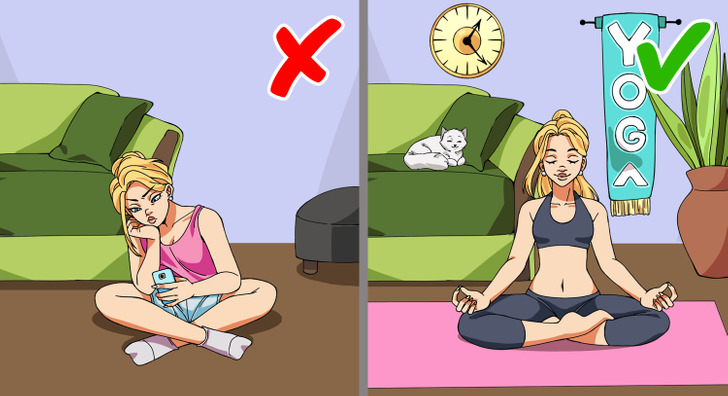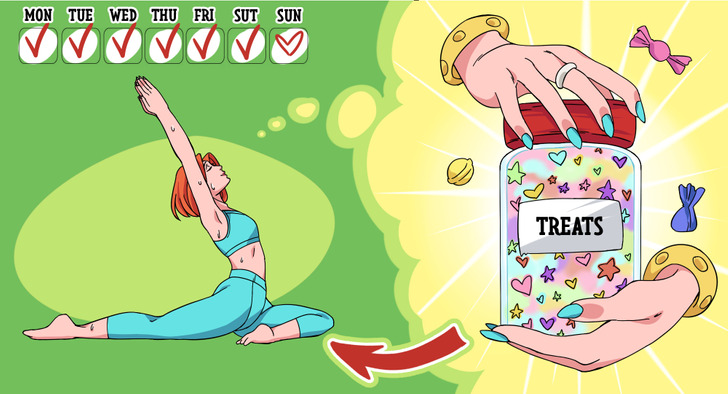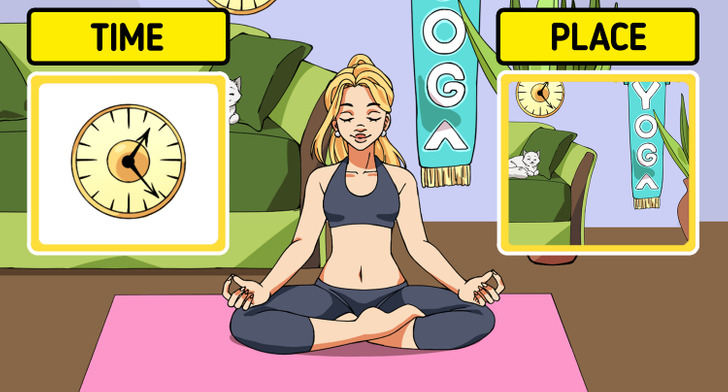12 Relationship Troubles That Exist Today


We all have something we’d like to accomplish. For some, it might be learning how to cook, for others, it might be building a home business. All equally valid and, for many of us, all equally hard. Especially when we have other things that occupy our days. And truth be told, habits that are settled are so hard to change.
Today at Bright Side, we’re going for the “it-doesn’t-seem-like-I’m-doing-much” type of change that no one ever talks about. Because the small things can have huge effects.

If the goal is to be a Yogi, but the living room you practice in has boring white walls and the TV is always on, finding motivation might be difficult. Keep your Yoga mat in a visible place, make it a rule to only turn on the TV on a certain schedule, and keep a poster on the wall that reminds you of practice, for example.
We are very influenced by our environment. Big sellers prime their stores to try to impact buyers, and interior designers study how spaces and visual cues affect the way we feel. Here, context is the key. Keep the things you don’t want out of sight and in sight those that relate to what you want. You might find yourself feeling naturally more engaged.

Reading only one page of a book a day is much easier than reading a chapter. Start there. Choose the small, easy and convenient. Want to engage on daily walks? Take the straight path, the one with no steep climbs or slopes. Want to start going to the gym? Choose the nearest to your house.
Every time we encounter friction (the gym being far away, the road having that part we don’t like), we slow down. And at the end of a long day of work, motivation might not work. So, anything you can think of that will ease it up: go for it. Leave the pan and the ingredients you want to use for your healthy breakfast on the balcony, your gym wear by the door, etc.

If you want to run really fast and win a marathon, and you’ve been doing some jogging, assume upfront, to yourself and to others, that you are a runner. When you make the thing you want part of your identity, you’ll adapt more naturally to the flow and the specifics of it. And habits will naturally follow.
We might have heard of this has the “fake it till you make it”, but there is more to it than “fake”. Our personality describes how we think and act, by changing it, our habits surely follow. Also, by focusing on something you feel is important, you’ll be creating an emotional response called “elevation”; a motivational state where people want to become better.

Create your own positive habit loop by rewarding yourself when you manage to make a small change often. Have a reward system. You can go for the checkmark if that makes it for you, or, as our brains love randomness, go for the jar with written treats. From an extra episode of your favorite series to “that” dessert, imagination is the limit.
The value of habits in our brains is to reduce the waste of energy. And repetition is a persuasive tactic. The more you choose the habit you want to favor, the more you’ll be prone to repeat it. And our brains are wired to pick up on things that reward us. So, even if the reward is something small, it might make a real difference in the big picture.

Create a routine by defining moments for the habits you want to set. Time and location are two mantras. Decide what you want to do, at what time, and where. You can go for an ampler “after my morning coffee”, or a “before dinner”, but be specific with the place and the action taking place there.
Like “After my morning coffee, I will stretch my back and shoulders for 15 min in the living room”. This will help make clear what exactly you need each day, allow you to keep track, and keep your focus on the new rituals (it’s the small things, remember).

You love food, you can cook really well, and you realize you would like to be a chef. Congratulations! Now stop there, do not get into daydreaming, or build-up your expectation on how great it will be once you get there. Having goals and dreams is the starting point for new ventures. We need them to know what we are aiming for, where we want to go, and that’s their job.
But if we convert our desires into big goals, we might feel we need to “make it big or go home”. And that creates unneeded, and demotivating, anxiety. Take that stress out of your way. You’ll also avoid the “arrival fallacy”; the psychological trap that occurs when we build our expectations too much, and then feel disappointed when we achieve our goals. Keep it small, keep it steady.
Do you have a new-year’s resolution you would really like to accomplish? Can you share? If you chose one of these, what step could you see yourself trying more easily?











